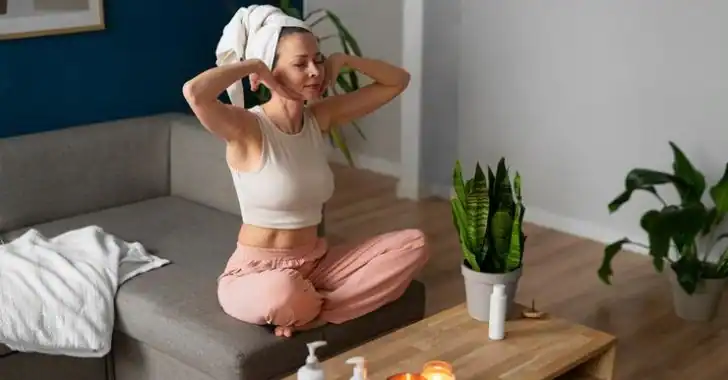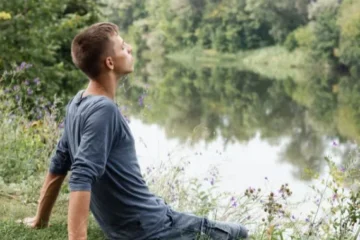In today’s fast-paced world, relaxation has become a luxury. Constant deadlines, obligations, and responsibilities can leave you feeling drained. However, incorporating relaxation into your daily routine isn’t just about indulgence—it’s essential for your physical and mental well-being. This guide explores actionable strategies to help you weave relaxation into your life effectively.
Why Relaxation Matters
Relaxation is more than just taking a break; it’s about giving your body and mind a chance to reset. Regular relaxation can:
- Reduce stress levels.
- Improve sleep quality.
- Boost mental clarity and focus.
- Enhance overall health by lowering blood pressure and strengthening the immune system.
Understanding its importance is the first step toward making relaxation a priority in your daily life.
1. Start Your Day with Intention
The way you start your day sets the tone for the rest of it. Create a morning routine that emphasizes calmness and mindfulness:
- Practice Gratitude: Begin your day by listing three things you’re grateful for.
- Stretch or Do Yoga: A few minutes of light stretching or yoga can help release tension and energize you.
- Limit Screen Time: Avoid checking your phone or emails first thing in the morning to maintain a stress-free mindset.
2. Schedule Relaxation Breaks
Amidst a busy schedule, it’s easy to forget to take breaks. However, scheduling short relaxation intervals can significantly reduce stress.
- Follow the Pomodoro Technique: Work for 25 minutes and then take a 5-minute break. Use these breaks for deep breathing or a quick walk.
- Enjoy a Cup of Tea: A calming herbal tea, such as chamomile or lavender, can soothe your nerves.
- Meditate: Spend 5-10 minutes focusing on your breath to clear your mind and reduce anxiety.
3. Create a Relaxing Environment
Your surroundings play a significant role in how relaxed you feel. Transform your space into a sanctuary of calmness:
- Declutter Your Space: A tidy area promotes mental clarity.
- Add Plants: Indoor plants like peace lilies and snake plants can enhance air quality and bring a sense of tranquility.
- Use Aromatherapy: Essential oils such as lavender, eucalyptus, and chamomile can create a calming atmosphere.
4. Engage in Relaxing Activities
Incorporating hobbies and activities you enjoy can bring relaxation into your routine:
- Read a Book: Escape into a fictional world or learn something new with non-fiction.
- Listen to Music: Create a playlist of calming or uplifting songs.
- Pursue a Hobby: Whether it’s painting, gardening, or knitting, doing something creative can be therapeutic.
5. Embrace Nature
Spending time in nature is a proven way to relax and recharge.
- Go for a Walk: A stroll in a park or nearby trail can instantly improve your mood.
- Try Forest Bathing: This Japanese practice involves immersing yourself in a forest environment to reduce stress.
- Watch a Sunset: The simple act of observing natural beauty can help you feel grounded and at peace.
6. Focus on Your Breathing
Breathing exercises are one of the quickest and most effective ways to relax:
- 4-7-8 Technique: Inhale for 4 seconds, hold your breath for 7 seconds, and exhale for 8 seconds. Repeat this cycle several times.
- Belly Breathing: Focus on filling your belly with air rather than your chest, which signals your body to relax.
- Breathing Apps: Use apps like Calm or Headspace for guided breathing exercises.
7. Limit Stressors
Identifying and minimizing stressors can help maintain a relaxed state throughout the day:
- Manage Your Time: Use tools like calendars or to-do lists to stay organized.
- Set Boundaries: Learn to say no to unnecessary obligations.
- Limit News Consumption: Overexposure to negative news can increase stress levels.
8. Incorporate Physical Relaxation Techniques
Relaxation isn’t just mental—it’s physical too. Focus on activities that release tension from your body:
- Massage Therapy: Regular massages can alleviate physical and mental tension.
- Progressive Muscle Relaxation (PMR): This technique involves tensing and then relaxing each muscle group in your body.
- Soak in a Warm Bath: Add Epsom salts or essential oils for an extra soothing experience.
9. Get Quality Sleep
Restful sleep is one of the most powerful ways to rejuvenate your mind and body:
- Create a Sleep Routine: Go to bed and wake up at the same time every day.
- Avoid Caffeine: Limit caffeine intake, especially in the afternoon.
- Optimize Your Sleep Environment: Use blackout curtains, a comfortable mattress, and white noise machines for better sleep quality.
10. Practice Mindfulness
Mindfulness is the practice of being present in the moment. Incorporating mindfulness into daily activities can reduce stress and increase relaxation:
- Eat Mindfully: Pay attention to the flavors, textures, and sensations of your meals.
- Mindful Walking: Focus on each step, the sensation of your feet touching the ground, and your surroundings.
- Mindfulness Apps: Try apps like Insight Timer or Simple Habit for guided mindfulness exercises.
11. Connect with Loved Ones
Spending quality time with family and friends can be incredibly relaxing. Positive social interactions boost happiness and reduce stress.
- Share a Meal: Enjoy a meal with loved ones without distractions.
- Have Meaningful Conversations: Discuss your feelings and listen to theirs.
- Participate in Group Activities: Join a book club, yoga class, or volunteer together.
12. Limit Technology Use
While technology has its benefits, overusing it can be overwhelming:
- Set Screen Time Limits: Use apps to monitor and limit your screen time.
- Digital Detox Days: Dedicate one day a week to being offline.
- Replace Scrolling with Journaling: Reflect on your day by writing instead of endlessly scrolling through social media.
Conclusion
Adding relaxation into your daily life doesn’t require drastic changes. By incorporating small, intentional practices into your routine, you can achieve a more balanced and stress-free lifestyle. Remember, relaxation is not a luxury—it’s a necessity for your overall health and well-being.
Start today by embracing one or more of these techniques, and watch as your life becomes calmer and more fulfilling.In today’s fast-paced world, relaxation has become a luxury. Constant deadlines, obligations, and responsibilities can leave you feeling drained. However, incorporating relaxation into your daily routine isn’t just about indulgence—it’s essential for your physical and mental well-being. This guide explores actionable strategies to help you weave relaxation into your life effectively.
Why Relaxation Matters
Relaxation is more than just taking a break; it’s about giving your body and mind a chance to reset. Regular relaxation can:
- Reduce stress levels.
- Improve sleep quality.
- Boost mental clarity and focus.
- Enhance overall health by lowering blood pressure and strengthening the immune system.
Understanding its importance is the first step toward making relaxation a priority in your daily life.
1. Start Your Day with Intention
The way you start your day sets the tone for the rest of it. Create a morning routine that emphasizes calmness and mindfulness:
- Practice Gratitude: Begin your day by listing three things you’re grateful for.
- Stretch or Do Yoga: A few minutes of light stretching or yoga can help release tension and energize you.
- Limit Screen Time: Avoid checking your phone or emails first thing in the morning to maintain a stress-free mindset.
2. Schedule Relaxation Breaks
Amidst a busy schedule, it’s easy to forget to take breaks. However, scheduling short relaxation intervals can significantly reduce stress.
- Follow the Pomodoro Technique: Work for 25 minutes and then take a 5-minute break. Use these breaks for deep breathing or a quick walk.
- Enjoy a Cup of Tea: A calming herbal tea, such as chamomile or lavender, can soothe your nerves.
- Meditate: Spend 5-10 minutes focusing on your breath to clear your mind and reduce anxiety.
3. Create a Relaxing Environment
Your surroundings play a significant role in how relaxed you feel. Transform your space into a sanctuary of calmness:
- Declutter Your Space: A tidy area promotes mental clarity.
- Add Plants: Indoor plants like peace lilies and snake plants can enhance air quality and bring a sense of tranquility.
- Use Aromatherapy: Essential oils such as lavender, eucalyptus, and chamomile can create a calming atmosphere.
4. Engage in Relaxing Activities
Incorporating hobbies and activities you enjoy can bring relaxation into your routine:
- Read a Book: Escape into a fictional world or learn something new with non-fiction.
- Listen to Music: Create a playlist of calming or uplifting songs.
- Pursue a Hobby: Whether it’s painting, gardening, or knitting, doing something creative can be therapeutic.
5. Embrace Nature
Spending time in nature is a proven way to relax and recharge.
- Go for a Walk: A stroll in a park or nearby trail can instantly improve your mood.
- Try Forest Bathing: This Japanese practice involves immersing yourself in a forest environment to reduce stress.
- Watch a Sunset: The simple act of observing natural beauty can help you feel grounded and at peace.
6. Focus on Your Breathing
Breathing exercises are one of the quickest and most effective ways to relax:
- 4-7-8 Technique: Inhale for 4 seconds, hold your breath for 7 seconds, and exhale for 8 seconds. Repeat this cycle several times.
- Belly Breathing: Focus on filling your belly with air rather than your chest, which signals your body to relax.
- Breathing Apps: Use apps like Calm or Headspace for guided breathing exercises.
7. Limit Stressors
Identifying and minimizing stressors can help maintain a relaxed state throughout the day:
- Manage Your Time: Use tools like calendars or to-do lists to stay organized.
- Set Boundaries: Learn to say no to unnecessary obligations.
- Limit News Consumption: Overexposure to negative news can increase stress levels.
8. Incorporate Physical Relaxation Techniques
Relaxation isn’t just mental—it’s physical too. Focus on activities that release tension from your body:
- Massage Therapy: Regular massages can alleviate physical and mental tension.
- Progressive Muscle Relaxation (PMR): This technique involves tensing and then relaxing each muscle group in your body.
- Soak in a Warm Bath: Add Epsom salts or essential oils for an extra soothing experience.
9. Get Quality Sleep
Restful sleep is one of the most powerful ways to rejuvenate your mind and body:
- Create a Sleep Routine: Go to bed and wake up at the same time every day.
- Avoid Caffeine: Limit caffeine intake, especially in the afternoon.
- Optimize Your Sleep Environment: Use blackout curtains, a comfortable mattress, and white noise machines for better sleep quality.
10. Practice Mindfulness
Mindfulness is the practice of being present in the moment. Incorporating mindfulness into daily activities can reduce stress and increase relaxation:
- Eat Mindfully: Pay attention to the flavors, textures, and sensations of your meals.
- Mindful Walking: Focus on each step, the sensation of your feet touching the ground, and your surroundings.
- Mindfulness Apps: Try apps like Insight Timer or Simple Habit for guided mindfulness exercises.
11. Connect with Loved Ones
Spending quality time with family and friends can be incredibly relaxing. Positive social interactions boost happiness and reduce stress.
- Share a Meal: Enjoy a meal with loved ones without distractions.
- Have Meaningful Conversations: Discuss your feelings and listen to theirs.
- Participate in Group Activities: Join a book club, yoga class, or volunteer together.
12. Limit Technology Use
While technology has its benefits, overusing it can be overwhelming:
- Set Screen Time Limits: Use apps to monitor and limit your screen time.
- Digital Detox Days: Dedicate one day a week to being offline.
- Replace Scrolling with Journaling: Reflect on your day by writing instead of endlessly scrolling through social media.
Conclusion
Adding relaxation into your daily life doesn’t require drastic changes. By incorporating small, intentional practices into your routine, you can achieve a more balanced and stress-free lifestyle. Remember, relaxation is not a luxury—it’s a necessity for your overall health and well-being.
Start today by embracing one or more of these techniques, and watch as your life becomes calmer and more fulfilling.



